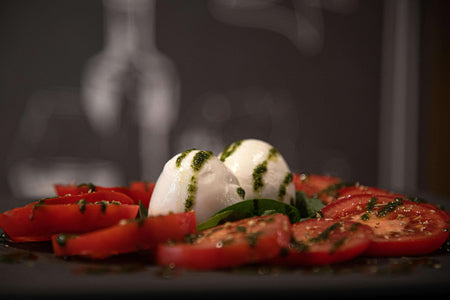Cemil, company.com

Nutritional Benefits of 200g Chickpeas
Chickpeas, also called garbanzo beans, are prized for their nutritional value and culinary flexibility. This blog explores the health benefits and nutritional content of 200g of chickpeas, highlighting why they're a dietary staple globally.
Nutritional Content of 200g Chickpeas
Chickpeas are packed with essential nutrients that contribute to overall health and well-being. Here's a breakdown of the nutritional content in a 200g serving of chickpeas:
- Calories: Approximately 360 calories.
- Protein: Provides about 20 grams of protein, it's essential for muscle repair and growth.
- Fiber: Contains around 12 grams of dietary fiber, which promotes digestive health and aiding in weight management.
- Fat: Offers about 6 grams of healthy fats, primarily polyunsaturated and monounsaturated fats.
- Carbohydrates: Provide approximately 60 grams of carbohydrates, including complex carbohydrates that provide sustained energy.
-
Vitamins and Minerals: Rich in folate, iron, phosphorus, and manganese, which are vital for various bodily functions such as red blood cell production, bone health, and energy metabolism.
Health Benefits of Chickpeas
- Heart Health: The high fiber and potassium content in chickpeas support heart health by lowering cholesterol levels and regulating blood pressure.
- Digestive Health: The combination of fiber and protein aids digestion, prevents constipation, and supports a healthy gut microbiome.
- Blood Sugar Regulation: Chickpeas have a low glycemic index, which helps in maintaining stable blood sugar levels and reducing the risk of type 2 diabetes.
- Weight Management: The fiber and protein content of chickpeas promote satiety, making you feel fuller for longer and aiding in weight control.
- Nutrient-Dense: Chickpeas are a nutrient-dense food, providing a wide array of vitamins, minerals, and antioxidants that contribute to overall health and immunity.
Ways to Include Chickpeas in Your Diet
- Salads: Add chickpeas to salads for a boost of protein and fiber.
- Hummus: Blend chickpeas with tahini, lemon juice, and garlic to make a delicious and nutritious dip.
- Curries and Stews: Use chickpeas in vegetarian curries or stews for added texture and protein.
- Roasted Snack: Roast chickpeas with olive oil and spices for a crunchy and satisfying snack.

Adding 200g of chickpeas to your diet provides valuable nutritional benefits, such as protein, fiber, and essential vitamins and minerals. Whether you enjoy them in salads, dips, or hearty stews, chickpeas are a nutritious addition to any meal plan. Explore various ways to incorporate chickpeas into your meals and enjoy their nutritional value.
Related articles
Top 10 Tulum Cheese Dishes: Quick and Easy Cooking Guide
Discover 10 delicious recipes featuring Tulum cheese, including grilled vegetable salad, stuffed peppers, tacos, frittata, roasted beet salad, flatbread, stuffed mushrooms, pasta, omelet, and pizza. Each dish showcases the rich, tangy flavor of Tulum cheese, adding a unique twist to your meals. Elevate your cooking with these simple yet flavorful recipes, and for the finest selection of Tulum cheese, visit Orontes Grocery today!
The Irresistible Turkish Bagel Recipe
Simit, an iconic Turkish street food, holds a special place in the hearts of food enthusiasts. These circular bread rings, coated in sesame seeds and baked to perfection, are more than just a snack; they are a culinary delight reflecting the rich flavors of Turkish cuisine. Let's dive into the world of Simit and discover how to make this irresistible Turkish bagel at home. Ingredients You'll Need: 4 cups all-purpose flour 1 tablespoon instant yeast 1 teaspoon salt 1 tablespoon sugar 1 1/2 cups lukewarm water 1/4 cup olive oil 1 egg white (for egg wash) Sesame seeds (for coating) Instructions: Prepare the Dough: In a large mixing bowl, combine the lukewarm water, sugar, and yeast. Let it sit for 5-10 minutes until frothy. Add the olive oil, salt, and half of the flour. Mix well. Knead the Dough: Gradually add the remaining flour and knead the dough on a floured surface for about 8-10 minutes until it's smooth and elastic. Place the dough in a greased bowl, cover it with a kitchen towel, and let it rise in a warm place for about 1 hour or until doubled in size. Shape the Simit: After the dough has risen, punch it down and divide it into 12 equal portions. Roll each portion into a long rope, about 18 inches long, and form it into a circle, overlapping the ends slightly. Press the ends together to seal. Prepare the Coating: In a shallow bowl, beat the egg white. In another bowl, place the sesame seeds. Coat the Simit: Dip each shaped bagel into the egg white, making sure to coat it evenly. Then dip it into the sesame seeds, covering the entire surface with seeds. Second Rise: Place the coated bagels on a baking sheet lined with parchment paper. Cover them with a kitchen towel and let them rise for another 30 minutes. Preheat and Bake: Preheat your oven to 400°F (200°C). Bake the risen bagels for 20-25 minutes or until golden brown and crispy. Enjoy Your Homemade Simit: Once baked, let the Simit cool on a wire rack before serving. These Turkish bagels are best enjoyed fresh and can be served with cheese, olives, jam, or simply on their own as a delightful snack. Tips for Perfect Simit Flour Matters: Using high-quality flour will make a significant difference in the texture of your Simit. Bread flour can also be used for a chewier texture. Proper Kneading: Ensure you knead the dough thoroughly to develop the gluten, which gives Simit its characteristic chewiness. Uniform Size: To ensure even baking, try to keep each Simit the same size and thickness. Crispy Crust: If you prefer a crispier crust, increase the baking time slightly but keep an eye on them to prevent burning. Storing Simit: If you have leftovers, store them in an airtight container to keep them fresh. You can also freeze them and reheat in the oven when needed. Benefits of Turkish Bagel (Simit) Rich in Fiber: Simit, made from flour and sesame seeds, supports digestion and a healthy gut. Source of Protein: Provides essential protein for muscle repair and overall body function. Healthy Fats: Contains olive oil and sesame seeds, offering heart-healthy fats. Cultural Experience: Enjoy Simit as a part of Turkish street food culture, connecting with Istanbul's vibrant culinary tradition. Versatile Snack: Perfect for breakfast or as a snack, enjoyed with cheese, olives, or jam. Homemade Goodness: Making Simit at home ensures freshness and quality ingredients, adding warmth to your table. Experience the Taste of Turkey: Making Simit at home is not just about baking bread; it's about experiencing the flavors and culture of Turkey in every bite. Whether you enjoy them for breakfast, as a snack, or with tea or coffee, Simit brings a taste of the bustling streets of Istanbul right to your kitchen. Share these delicious treats with family and friends and savor the joy of homemade Turkish bagels. Afiyet olsun! (Enjoy your meal!)








